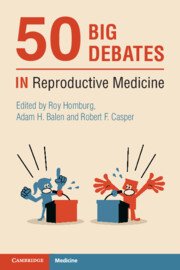Book contents
- 50 Big Debates in Reproductive Medicine
- Series page
- 50 Big Debates in Reproductive Medicine
- Copyright page
- Contents
- Contributors
- Foreword
- Introduction
- Section I Limits for IVF
- 1A Female Age 42 Years Should Be the Upper Limit for Conventional IVF/ICSI Treatment
- 1B Female Age 42 Years Should Be the Upper Limit for Conventional IVF/ICSI Treatment
- 2A Women with a BMI over 40 Should Be Refused Fertility Treatment
- 2B Women with a BMI over 40 Should Be Refused Fertility Treatment
- 3A Female Age of Menopause Is a Fair Limit for Ovum Donation
- 3B Female Age of Menopause Is a Fair Limit for Ovum Donation
- 4A Social Egg Freezing Should Be Available Up To the Age of 40 Years
- 4B Social Egg Freezing Should Be Available Up To the Age of 40 Years
- Section II IVF Add-ons
- Section III The Best Policy
- Section IV Embryology
- Section V Ethics and Statistics
- Section VI Male-factor Infertility
- Section VII Genetics
- Section VIII Ovarian Stimulation
- Section IX Hormones and the Environment
- Index
- References
4B - Social Egg Freezing Should Be Available Up To the Age of 40 Years
Against
from Section I - Limits for IVF
Published online by Cambridge University Press: 25 November 2021
- 50 Big Debates in Reproductive Medicine
- Series page
- 50 Big Debates in Reproductive Medicine
- Copyright page
- Contents
- Contributors
- Foreword
- Introduction
- Section I Limits for IVF
- 1A Female Age 42 Years Should Be the Upper Limit for Conventional IVF/ICSI Treatment
- 1B Female Age 42 Years Should Be the Upper Limit for Conventional IVF/ICSI Treatment
- 2A Women with a BMI over 40 Should Be Refused Fertility Treatment
- 2B Women with a BMI over 40 Should Be Refused Fertility Treatment
- 3A Female Age of Menopause Is a Fair Limit for Ovum Donation
- 3B Female Age of Menopause Is a Fair Limit for Ovum Donation
- 4A Social Egg Freezing Should Be Available Up To the Age of 40 Years
- 4B Social Egg Freezing Should Be Available Up To the Age of 40 Years
- Section II IVF Add-ons
- Section III The Best Policy
- Section IV Embryology
- Section V Ethics and Statistics
- Section VI Male-factor Infertility
- Section VII Genetics
- Section VIII Ovarian Stimulation
- Section IX Hormones and the Environment
- Index
- References
Summary
The last decade has seen a significant increase in the number of egg freezing cycles performed across the world. Often described as a fertility preservation or fertility extension technology, social egg freezing (henceforth SEF) has the potential to allow women to defer childbearing to later in their reproductive lives which can benefit users in a multitude of different ways (Baldwin, 2019). However, there are several reasons we should think twice before recommending such an elective procedure to otherwise healthy women.
- Type
- Chapter
- Information
- 50 Big Debates in Reproductive Medicine , pp. 22 - 23Publisher: Cambridge University PressPrint publication year: 2021

